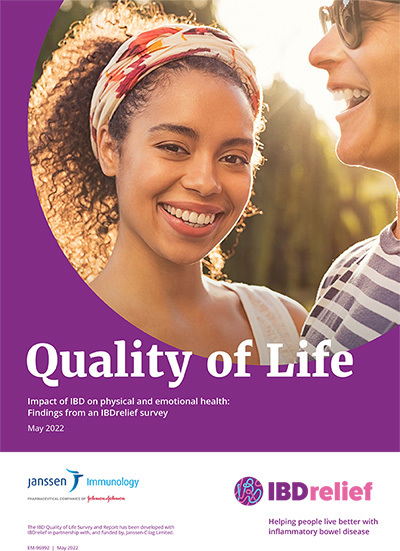Impact of IBD on physical and emotional health: Findings from an IBDrelief survey
The findings of an IBDrelief survey have revealed the huge impact inflammatory bowel disease (IBD) and its associated symptoms have on the lives of people with the disease.
The survey, carried out in conjunction with Janssen Cilag Ltd., asked people with Crohn’s disease, ulcerative colitis and other forms of IBD about the emotional and mental impact the disease has on them.
The report setting out the findings reveals the key insights in five areas - the impact of symptoms, the impact on people’s lives and future plans, the emotional impact, support received and the impact of the COVID-19 pandemic.
The key findings are set out below. You can download a full copy of the report by clicking on the button below.
Download our report
“
You have to cope with sometimes drastic changes in your life – breakdown of relationships, losing a job and the social side of having a job, finding out you probably won’t have children. ”
Abilty to leave the home
66% In remisson
9% In flare
Impact of IBD on lives and future plans
IBD can have a large impact on the daily living and future plans of those living with the illness. Of our 167 respondents:
- Most respondents report being able to participate in everyday life tasks such as leaving the house (66%), being in a job (58%) and socialising (55%) when in remission, but struggle with these same tasks when their disease flares
- Over two-thirds of respondents anticipate that their condition will make it more difficult in the future to improve their overall health (69 per cent) and to travel (67%)
- Two-thirds (67%) of respondents aged 18-34 feel that their condition will make it harder to have children
Impact of IBD symptoms
Symptoms have a huge impact on the lives of people with IBD, particularly during a flare. Of our 167 respondents:
- 4 in 10 respondents report that they have accidents ‘occasionally’; 18% of patients with moderate-to-severe IBD say they have accidents ‘daily’
- Respondents report spending 40 minutes per day on average using the toilet when in remission and 2.5 hours per day during a flare
- Nearly half of respondents who are impacted by the number of toilet visits rate the impact on their emotional wellbeing as 10/10 (highly significant impact) during a flare
- 3 in 4 respondents say they experience fatigue daily. For respondents with moderate-to-severe IBD, 6 in 7 in respondents report daily fatigue
- On average, respondents rate the impact of their fatigue on their emotional wellbeing as 7.6/10 (where 10/10 is most significant)
“
I would like more education about chronic fatigue. I have had times where I’ve been physically too tired to respond to a text message; the fatigue is unreal. ”
Emotional impact of IBD
IBD has a large, often overlooked emotional impact on people living with the illness. Of our 167 respondents:
- Over half of respondents worry about their disease daily
- 7 in 10 respondents said they feel embarrassed by their disease at least some of the time1
- Anxiety, low mood and low self-confidence were reported as the main negative impacts of IBD
- Respondents said that the most challenging aspects of their condition are managing the physical symptoms and the need to plan ahead when travelling or when out
- Most respondents said that they have taken steps to manage their condition such as avoiding stressful situations and missing social occasions
Support for IBD
People with IBD may need support for more than just symptoms from their IBD team and outside the clinic. Of our 167 respondents:
- Only one-third of respondents said their consultant has discussed a long-term plan with them
- Two-thirds of respondents said their consultant has not explained the link between physical symptoms and emotional health
- Only a quarter of respondents have discussed emotional wellbeing with their IBD teams
- A third of respondents have sought support from other sources or organisations, and another third would like further direction about where to go
- Almost two-thirds of respondents say much more support is required than what they are currently receiving
1/4 have discussed emotional wellbeing with their IBD teams
“
Every time I’ve been in clinic, it’s 5-10 mins tops, and it’s all about IBD symptoms – nothing else like how you are mentally or emotionally. It’s like they just care about the IBD side and forget that living with this illness causes mental and emotional problems to the patients too. ”
The IBD Quality of Life Survey and Report has been developed in partnership with, and funded by, Janssen-Cilag Limited. EM-99379. May 2022
1Includes respondents who worry about their condition constantly (23%) and every day (35%)
2Includes respondents who feel embarrassed by their condition sometimes (28%), frequently (28%) and daily (14%).
